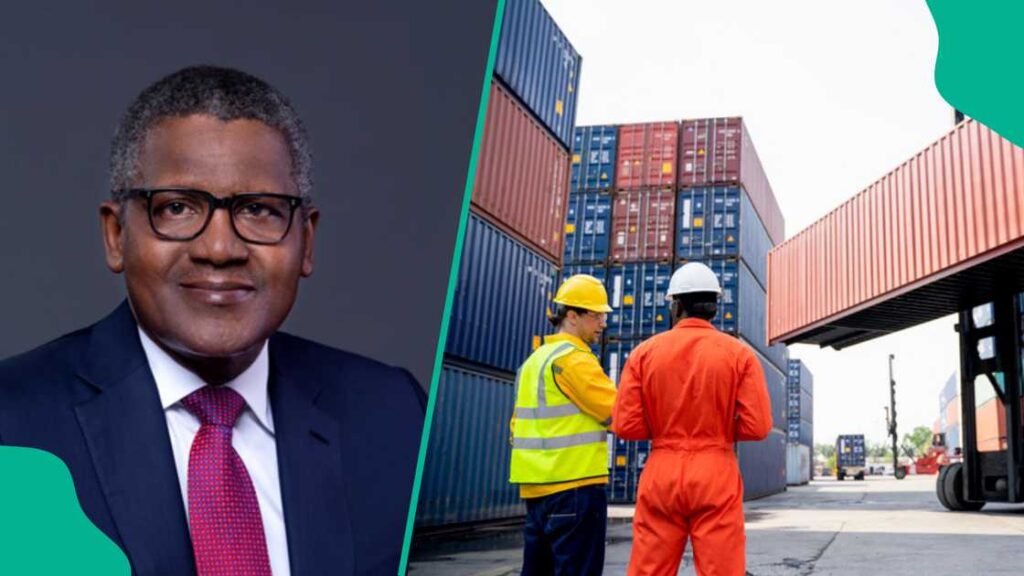Africa’s richest man, Aliko Dangote, is once again reshaping Nigeria’s industrial map, this time by filing to construct what could become the country’s largest and deepest seaport in Olokola, Ogun State. The bold project signals a fresh push to boost exports, unlock LNG potential, and strengthen the Dangote Group’s massive industrial footprint.
The plan, described by Dangote himself as “the biggest, deepest port in Nigeria,” was set in motion after paperwork was submitted to authorities in late June 2025, according to Bloomberg. The Olokola site sits about 100 kilometres from the Dangote refinery and fertiliser complex in Lagos, promising to transform Nigeria’s logistics and export landscape.
By building directly in Olokola, the group aims to do more than expand its own business; it hopes to spark broader private-sector participation in Nigeria’s underdeveloped port infrastructure.
“It’s not that we want to do everything by ourselves, but I think doing this will encourage other entrepreneurs to come into it,” Dangote explained in an interview.
Here’s why Dangote’s plans to move Nigeria’s largest seaport matter, and what it could change:
-
Strategic location:
The proposed Atlantic seaport at Olokola offers a direct export channel for fertiliser, urea and, soon, liquefied natural gas (LNG). It’s positioned to rival Lagos ports, including the recently opened Chinese-backed Lekki Deep Sea Port. -
Boost to LNG exports:
The Dangote Group plans to build pipelines connecting Nigeria’s gas-rich Niger Delta to the new port, aiming to surpass the output of Nigeria LNG Limited (NLNG), currently Africa’s top LNG exporter. -
Return to Olokola:
Years ago, Dangote abandoned plans to build his refinery and fertiliser plant at Olokola due to disputes with local authorities. With relations now improved under a new Ogun State administration, the group is making a comeback. -
Integrated logistics:
Dangote currently exports products through a jetty at the Lekki site. The Olokola seaport promises a larger, permanent solution, consolidating operations across fertiliser, petrochemicals, and LNG. -
Fuel distribution ambitions:
Starting August 2025, Dangote plans nationwide fuel distribution using a fleet of 4,000 gas-powered trucks. While critics warn of potential market dominance, Dangote rejects claims of monopolising the sector.
Beyond his refinery and fertiliser plants, Dangote is known for continually expanding his empire into new sectors, and the Olokola port project fits that strategy perfectly. The seaport not only promises billions in exports but could transform regional trade routes and create thousands of jobs.
According to Devakumar Edwin, vice president of the Dangote Group, the pipeline and LNG export plan is especially ambitious:
“We want to do a major project to bring more gas than what NLNG is doing today,” Edwin noted.
“We know where there is a lot of gas, so run a pipeline all through and then bring it to the shore.”
Why it matters:
Nigeria remains a giant in crude oil but has struggled to diversify exports or modernise infrastructure. With an estimated net worth of $27.8 billion, Dangote’s investment could do what decades of policy failed to achieve: open Nigeria’s economy to new markets and reduce overdependence on oil.
By integrating fertiliser, LNG, petrochemicals, and fuel under a single export hub, Dangote’s vision could also spark copycat projects, encouraging other Nigerian entrepreneurs to invest in large-scale logistics and energy infrastructure.
In short:
The move shows how bold private investment can fill gaps left by public infrastructure, and how a single project can shift Nigeria’s trade future.
From the refinery in Lagos to the pipeline across the Niger Delta and now a record-breaking deep-seaport, Dangote is building more than an empire. He’s laying down the tracks for Nigeria’s next export boom.

